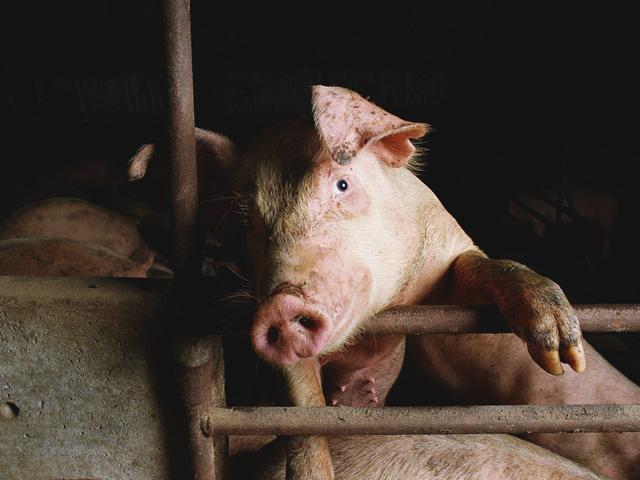African Swine Fever Vax Breakthrough
African Swine Fever Vaccine Candidate Shows Promise in Blocking Spread
LINCOLN, Neb. (DTN) -- One of several African swine fever vaccine candidates has been successful in blocking both European- and Asian-bred swine against the current circulating Asian strain, USDA said on Thursday.
USDA research by Agricultural Research Service scientists highlighted in the journal Transboundary and Emerging Diseases shows one particular vaccine candidate also can be commercially produced and maintain its "vaccine efficacy" against Asian ASF strains when tested in both European and Asian breeds of swine, USDA said in a news release.
The findings show the vaccine could be replicated and prevent the spread of the virus, the agency said.
The vaccine revealed immunity in about one-third of swine by the second week post-vaccination, USDA said, with full protection in all swine achieved by the fourth week.
"This is a major step for science and agriculture," said ARS research microbiologist Manuel Borca. "We are working carefully to see our vaccine candidate commercialized through the joint efforts of the U.S. government, and our commercial partner, the Navetco National Veterinary Joint Stock Company."
Previous studies, USDA said, were done only in European-bred pigs using an ASF sample from the initial outbreak.
ARS foreign animal disease research microbiologist Douglas Gladue said the latest research "signals that the live attenuated vaccine candidate could play an important role in controlling the ongoing outbreak threatening the global pork supply."
ARS successfully engineered and patented five ASF experimental vaccines and executed seven licenses with pharmaceutical companies to develop the vaccines.
P[L1] D[0x0] M[300x250] OOP[F] ADUNIT[] T[]
Earlier in September, ASF was confirmed in Haiti for the first time in 37 years. The virus may have spread from the Dominican Republic where it was identified in the Western Hemisphere for the first time in decades.
USDA's Animal Health Inspection Service announced in recent weeks it had shut off the flow of pork products from Puerto Rico and the U.S. Virgin Islands while the U.S. government sets up a system to prevent the spread of the virus to the mainland U.S.
So far, ASF has not been detected in Puerto Rico or the U.S. Virgin Islands.
The Animal and Plant Health Inspection Service on July 28 confirmed ASF in the Dominican Republic. On Aug. 26, APHIS announced plans to establish a foreign animal disease protection zone around Puerto Rico and the U.S. Virgin Islands.
APHIS said that once the protection zone was established, the agency would be able to restrict movement of live swine and products out of the protection zone, conduct surveillance within the zone, conduct a public-education campaign on biosecurity on farms, prohibit the movement of live swine and products outside of the region and to contact report clinical cases to authorities.
ASF has no human health implications, but the disease is deadly to swine and spreads rapidly through a herd.
ASF led to rapid slaughter of millions of hogs in China in late 2018 and early 2019, cutting the world's largest swine herd down as much as 40% and leading China to basically rebuild its entire swine industry in the process. The ripple effect led to a high volume of global pork exports to China, including from the U.S., in response.
Chinese officials said in 2020 the country had gotten a handle on the disease, but USDA in April 2020 cited that underreporting of cases was now a problem in China as producers in the country were reluctant to report any new outbreaks because of fears of economic losses.
Germany was originally hit with ASF in its feral hog population last year, which effectively cut off exports from the country. German officials reported ASF had been found in at least three farms, affecting domestic pigs.
U.S. and Canadian officials have since been concerned about the potential risks for ASF landing in North America and the potential devastation it would cause. The risks are high, considering the U.S. exported a record $7.7 billion in pork in 2020 and is largely keeping close pace with that sale volume so far in 2021. The risk of a single case could effectively close U.S. export markets.
The majority of swine used in the global food supply are produced in Asia, where the virus has been causing outbreaks and devastating losses to the swine industry.
ASF originally was detected in 2007 in the Republic of Georgia and is known to cause virulent, deadly disease outbreaks in wild and domesticated swine.
Read more on DTN:
"USDA Aims at Ag Woes in $3B Package," https://www.dtnpf.com/…
"African Swine Fever Confirmed in Haiti," https://www.dtnpf.com/…
"USDA Suspends Pork Products Movement," https://www.dtnpf.com/…
Todd Neeley can be reached at todd.neeley@dtn.com
Follow him on Twitter @DTNeeley
(c) Copyright 2021 DTN, LLC. All rights reserved.



